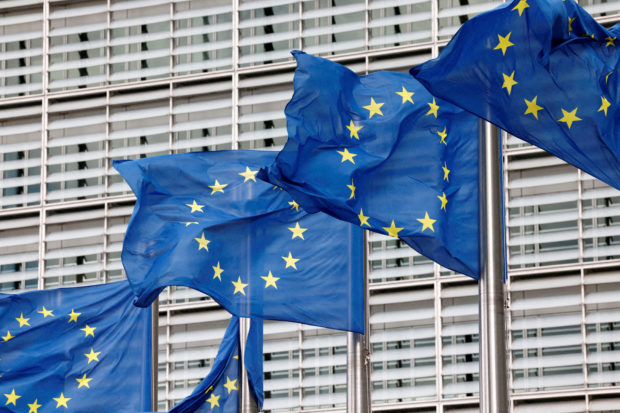Big tech to face full force of new EU law

European Union flags flutter outside the EU Commission headquarters in Brussels, Belgium, Sept. 28, 2022. (REUTERS FILE PHOTO)
BRUSSELS — The world’s biggest digital companies will have nowhere to hide starting Friday, when the toughest EU rules on online content since social media first burst onto the scene enter into force.
The landmark law is part of the European Union’s legal arsenal deployed to bring tech companies to heel and enforce order in what officials have described as an online “Wild West.”
The Digital Services Act (DSA) forces companies to more aggressively police digital content and protect online users from disinformation and hate speech, or face the risk of heavy fines.
From Friday, all eyes will be on how the platforms comply and on how the DSA will change online life in Europe, with experts predicting it could trigger a wave of change beyond the bloc.
“The DSA is part of a bigger strategy to give more power to individuals, to the regulators, to civil society,” said Suzanne Vergnolle, a professor of technology law at the National Conservatory of Arts and Crafts in Paris.
Article continues after this advertisement“It is another step toward more accountability,” she told Agence France-Presse (AFP).
Article continues after this advertisementUnder the DSA, sites with at least 45 million active monthly users must obey more stringent rules including annual compliance audits and a duty to effectively counter disinformation.
In April, the EU named 19 sites including the Amazon Store, Apple’s AppStore, and Google’s Play, Maps and Shopping, and clothing retailer Zalando, as well as the social media giants Instagram, LinkedIn, Pinterest, Snapchat, TikTok, YouTube and Twitter (now rebranded X) and the search engines from Google and Microsoft’s Bing.
Even before the rules kick in, Amazon and Zalando have filed legal challenges, claiming their platforms do not fit the criteria to fall foul of the first wave of regulation.
Rush to comply
Despite the potential impact of the changes, individual users will not suddenly wake up next week and instantly feel the DSA’s effects.
“It’s something where we’re already starting to see trickles of it in terms of platforms proactively going about doing their compliance,” said John Albert of AlgorithmWatch, a nonprofit research and advocacy organization.
The bloc’s top official for enforcing digital regulation, industry commissioner Thierry Breton, said companies “had now enough time to adapt their systems to their new obligations.”
“My services and I will thoroughly enforce the DSA, and fully use our new powers to investigate and sanction platforms where warranted,” he told AFP.
That was on full display in changes heralded by companies this summer.
For example, Facebook- and Instagram-owner Meta and TikTok announced in August steps they would take to comply, including giving European users more control over how they view content, with the option to opt out of recommendations based on profiling.
The EU will be looking particularly at X since billionaire Elon Musk took over the Twitter platform last year, taking decisions over content that have provoked concerns over compliance.
Breton has previously warned Musk, who has embarked on a cost-cutting drive for the platform, that X needs enough resources to moderate dangerous content.
Google, meanwhile, says it has not waited for the DSA’s rules to apply, and has already implemented policies aimed at greater transparency and accountability.
The European Commission said that despite the legal challenges, companies must still comply.
Risk of fines
EU officials say more companies could be added to the list.
Violating the rules could lead to fines of up to 6 percent of a company’s global revenue, or even a ban.
Meanwhile, another EU law is looming for big tech firms.
Next month, the bloc will name which tech companies have to obey tougher competition rules under the new Digital Markets Act (DMA).
In July, Brussels published a list of companies deemed to be “gatekeepers” including Amazon, Apple, TikTok’s owner ByteDance, Google, Meta, Microsoft, and Samsung.
Such a status comes with extra rules that include preventing companies from controlling what apps are pre-installed on phones, or from directing users to their products.
A company in DMA violation risks a fine of up to 10 percent of its annual global revenue.